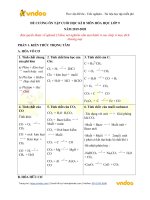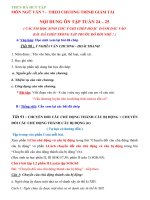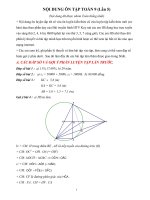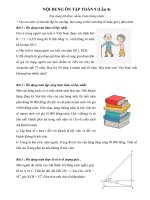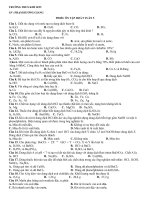Anh-10_-Noi-dung-on-tap-tuan-9-tu-7_4-den-10_4_2020
Bạn đang xem bản rút gọn của tài liệu. Xem và tải ngay bản đầy đủ của tài liệu tại đây (404.9 KB, 5 trang )
Anh 12 – Tuần 9
UNIT 8: NEW WAYS TO LEARN
A. VOCABULARY
(xem phần từ vựng trong tài liệu tự chọn trước khi làm bài)
I. Complete the table
Word/ phrase
Part of
speech
Transcription
Explanation / Definition
1. access
(v)
/ˈækses/
to use a computer system such
as the internet.
2. application
(n)
/ˌæplɪˈkeɪʃn/
A computer program that is
desiged for a particular
purpose
3. concentrate
(v)
/ˈkɒnsntreɪt/
to direct your attention or your
efforts towards a particular
activity, subject, or problem
4. device
(n)
/dɪˈvaɪs/
machine that has been invented
for a particular purpose
5. digital
(adj)
/ˈdɪdʒɪtl/
recording or storing information
as a series of the numbers 1 and
0, to show that a signal is present
or absent
a condition or situation that
causes problems, especially one
that causes something or
someone to be less successful
than other things or people
6. disadvantage
(n)
/ˌdɪsədˈvɑːntɪdʒ/
7. educate
(v)
/ˈedʒukeɪt/
8. education
(n)
/ˌedʒuˈkeɪʃn/
9. educational
(adj)
/ˌedʒuˈkeɪʃənl/
10. fingertip
(n)
/ˈfɪŋɡətɪp/
the end of a finger
11. identify
(v)
/aɪˈdentɪfaɪ/
to recognize someone or
something and say or prove who
or what that person or thing is
12. improve
(v)
/ɪmˈpruːv/
to (cause something to) get
better
13. instruction
(n)
/ɪnˈstrʌkʃn/
something that someone tells
you to do
14. native
(adj)
/ˈneɪtɪv/
relating to or describing
to teach someone, especially
using the formal system of
school, college, or university:
the process of teaching or
learning, especially in a school
or college, or the knowledge that
you get from this
providing education or relating
to education
Meaning
someone's country or place of
birth or someone who was born
in a particular country or place
15. portable
(adj)
/ˈpɔːtəbl/
light and small enough to be
easily carried or moved
16. software
(n)
/ˈsɒftweə(r)/
the instructions that control what
a computer does; computer
programs
17. syllable
(n)
/ˈsɪləbl/
a single unit of speech, either a
whole word or one of the parts
into which a word can be
separated, usually containing a
vowel
18. technology
(n)
/tekˈnɒlədʒi/
(the study and knowledge of) the
practical, especially industrial,
use of scientific discoveries
19. touch
screen
(np)
/tʌtʃskriːn/
a screen on a computer, phone,
etc. that you touch in order to
give it instructions, rather than
using a keyboard or keypad
20. Voice
recognition
(np)
/vɔɪsˌrekəɡˈnɪʃn/ the ability of a computer or other
machine to understand spoken
instructions or to recognize who
a human voice belongs to
II/ Put the correct word in the box to complete the sentences below.
physical/ electronic/ benefits/ digital/ motivate/ personal/ relative/ technology/ defining/
applications/disruptive/ mobile .
1. The phrase “……………. natives’ refers to people who are familiar with computers and the
internet from an early age.
2. The internet will …………..… students to study more effectively.
3. Please don’t ask him questions about his family. he hates answering ………….. questions.
4. Our students are very excited when they have opportunities to do …………... exercise.
5. My son, who is a promising pianist, is now interested in composing ……….... music.
6. Many teachers have now understood the ………….. that mobile devices can bring.
7. I’m looking for some new ………….. to put on my smartphone to improve my English
pronunciation.
8. The ringing sound from mobile phones is ………….. and annoying in the classroom.
9. People are now familiar with the term m-learning or ………... learning, which focuses on the
use of personal electric devices.
10. In the grammar part of this unit we study …………. clauses.
11. That laptop, which has the latest ………..., is very expensive.
12. Some of my classmates think that it is not easy to know which clause is ………. and which is
non-defining.
B. GRAMMAR
RELATIVE CLAUSES
Non-defining and defining relative clause. (Mệnh đề quan hệ xác định và mệnh đề quan hệ không
xác định)
- Mệnh đề quan hệ (relative clause) còn được gọi là mệnh đề tính ngữ (adjective clause) được dùng để
bổ nghĩa cho danh từ đứng trước nó, thường bắt đầu bằng một đại từ quan hệ (relative pronoun)
như who, whom, whose, which, that.
- Có hai loại mệnh đề quan hệ: mệnh đề quan hệ hạn định hay còn gọi là mệnh đề quan hệ xác
định (defining relative clause) và mệnh đề quan hệ khơng hạn định cịn gọi là mệnh đề quan hệ không
xác định (non-defining relative clause).
* Trong mệnh đề quan hệ thì
- who thay cho chủ ngữ chỉ người;
Ex: Do you know the people who live over the road?
Bạn có biết những người sống bên đường kia không?
- whom thay cho tân ngữ chỉ người;
Ex: The woman whom my brother is talking to is my English teacher.
Người phụ nữ mà anh trai tơi đang nói chuyện là cơ giáo tiếng Anh của tơi.
- whose thay cho tính từ sở hữu;
Ex: The woman whose daughter is studying in my class is my English teacher.
Người phụ nữ có cơ con gái đang học ở lớp tôi là cô giáo tiếng Anh của tôi.
- which thay cho chủ ngữ hoặc tân ngữ chỉ vật;
Ex: Did you see the letter which came today?
Bạn có thấy bức thư đến vào hôm nay không?
Now they were driving by the houses which Andy had described.
Bây giờ họ đang chạy xe qua những ngôi nhà mà Andy miêu tả.
- that có thể thay thế cho who, whom, which trong mênh đề quan hệ hạn định; ngoài ra chỉ dừng
riêng that, trong các trường hợp trước that có các từ all, first, second,... last, most, best, only.
Ex: It’s the most interesting book that I’ve ever read.
Đó là cuốn sách hay nhất mà tôi từng đọc.
a) Defining clause (Mệnh đề quan hệ xác định)
Mệnh đề quan hệ xác định được dùng để xác định danh từ (người hoặc vật) mà câu đang đề cập tới.
❖ Đặc điểm của mệnh đề quan hệ xác định:
+ Cần thiết cho nghĩa cả câu nên khơng thể lược bỏ được.
+ Có chức năng như tính từ - bổ nghĩa cho danh từ đứng trước đó.
+ Cung cấp thêm thơng tin có liên quan đến người nào đó hoặc điều gì đó có liên hệ đến mệnh đề
chính.
Ex: The boy that is playing football over there is my son.
Cậu bé đang chơi đá bóng đằng kia là con trai tôi.
+ Mệnh đề quan hệ xác định được dùng để định rõ người nào hoặc vật nào mà chúng ta muốn đề cập
đến.
Ex: The book which I lent you is interesting.
Quyển sách mà tôi cho bạn mượn thì rất là thú vị.
■ Khi chúng ta dùng mệnh đề quan hệ xác định, đại từ liên hệ có thể làm chủ ngữ hoặc tân ngữ của
mệnh đề.
* Đại từ liên hệ làm chủ ngữ của mệnh đề.
Ex: The girl who lives next door is very friendly.
Cô gái mà sống cạnh nhà tôi thì rất là thân thiện.
* Đại từ liên hệ làm tân ngữ của mệnh đề.
Ex: That’s the lovely girl whom I met at Loan’s party last night.
Đó là cơ gái dễ thương mà tôi gặp ở buổi tiệc của Loan vào tối hôm qua.
b) Non-defining relative clause (Mệnh đề quan hệ không xác định)
❖ Đặc điểm của mệnh đề quan hệ không xác định
+ Không cần thiết cho ý nghĩa của cả câu.
+ Có thể loại bỏ mệnh đề quan hệ khơng xác định mà câu vẫn có đầy đủ ý nghĩa.
+ Mệnh đề quan hệ không xác dịnh thường ở giữa hai dấu phẩy.
+ Không được lược bỏ đại từ quan hệ trong loại mệnh đề quan hệ này.
+ Không được dùng đại từ quan hệ that.
Ex: Lan, who is wearing a white skirt, is my friend.
Lan người mà đang mặc chiếc váy màu trắng là bạn tôi.
Tom, whose father is English, speaks both French and English.
Tom người mà cha của anh ta là người Anh thì nói được cả hai thứ tiếng Pháp và Anh.
❖ Các trường hợp mệnh để quan hệ không xác định bổ nghĩa:
- Là các đại từ chỉ dịnh (this, that, these, those) + Noun
Ex: This man, who sat next to me, sang well.
Người đàn ơng ngồi gần tơi hát hay.
- Tính từ sở hữu (My, your, his, her,...) + Noun
Ex: His daughter, who sat next to mé, sang well.
Con gái anh ta, người ngồi gần tôi, hát hay.
- Thường là các danh từ riêng (tên riêng, địa danh,...)
Ex: Nam, who sat next to me, sang well.
Nam, người ngồi gần tôi, hát hay.
- Noun + prepositions + Noun2: Ngữ danh từ
Ex: The lady in red, who sat next to me, sang well.
EXERCISES
I/ Fill in the blanks with WHO, WHICH or WHOSE:
1. Vinh, ………….. is only two and a half, likes to play games on a tablet.
2. My tablet, ………..…..is two years old, still works quite well.
3. Personal electronic devices …………. distract students from their class work are blamed in most
schools.
4. Students ………..… have smartphones can use them to look up words in an electronic
dictionary.
5. Some scientists think that children ………. parents allow them to use electronic devices early
will have more advantages in the future.
6. The laptop …….. cover is decorated with funny animals belongs to my aunt.
7. The engineers ………. designed the building received an award.
8. The Pacific Ocean, ………..might have been crossed by raft during the Stone Age, is the world's
largest ocean.
9. The newspaper to ………… we subscribe is delivered regularly.
10. The townspeople, ………….. pride in their community is well- known, raised enough money to
build a new town hall.
II. Combine These Pairs Of Sentences Using Relative Pronouns:
1. The first boy has just moved. He knows the truth.
2. I don't remember the man. You said you met him at the canteen last week.
3. The only thing is how to go home. It make me worried.
4. The most beautiful girl lives city. I like her long hair very much.
5. The children often go swimming on Sundays. They have much free time then.
6. They are looking for the man and his dog. They have lost the way in the forest.
7. My wife wants you to come to dinner. You were speaking to my wife
8.The book was a lovely story. I was reading it yesterday.
9. The botanist will never forget the day. He found a strange plant on that day.
10. The man works for my father's company. The man's daughter is fond of dancing.
THE END

